- Home
- K. M. Ashman
The Warrior Princess
The Warrior Princess Read online
ALSO BY K. M. ASHMAN
THE INDIA SOMMERS MYSTERIES
The Dead Virgins
The Treasures of Suleiman
The Mummies of the Reich
The Tomb Builders
THE ROMAN CHRONICLES
The Fall of Britannia
The Rise of Caratacus
The Wrath of Boudicca
THE MEDIEVAL SAGAS
Blood of the Cross
In Shadows of Kings
Sword of Liberty
Ring of Steel
THE BLOOD OF KINGS
A Land Divided
A Wounded Realm
Rebellion’s Forge
INDIVIDUAL NOVELS
Savage Eden
The Last Citadel
Vampire
AUDIO BOOKS
A Land Divided
A Wounded Realm
Blood of the Cross
The Last Citadel
Rebellion’s Forge
This is a work of fiction. Names, characters, organizations, places, events and incidents are either products of the author’s imagination or are used fictitiously.
Text copyright © 2017 K. M. Ashman
All rights reserved.
No part of this book may be reproduced, or stored in a retrieval system, or transmitted in any form or by any means, electronic, mechanical, photocopying, recording, or otherwise, without express written permission of the publisher.
Published by Thomas & Mercer, Seattle
www.apub.com
Amazon, the Amazon logo, and Thomas & Mercer are trademarks of Amazon.com, Inc., or its affiliates.
ISBN-13: 9781612185781
ISBN-10: 1612185789
Cover illustration by Chris McGrath
Cover design by Richard Augustus
Map illustration by David Woodroffe
Contents
MEDIEVAL MAP OF WALES
Character list
Prologue Wales AD 1135
The Carmarthen Road December 6th, AD 1135
Pembroke Castle December 7th, AD 1135
Pembroke Castle December 8th, AD 1135
Pembroke Castle December 8th, AD 1135
Llandeilo Manor December 9th, AD 1135
The Cantref Mawr December 15th, AD 1135
The Cantref Mawr December 16th, AD 1135
Pembroke Castle December 17th, AD 1135
Llandeilo Manor December 20th, AD 1135
Pembroke December 20th, AD 1135
Pembroke Castle December 20th, AD 1135
The Cantref Mawr December 20th, AD 1135
Pembroke Castle December 22nd, AD 1135
The Cantref Mawr December 23rd, AD 1135
Kidwelly Castle December 23rd, AD 1135
Kidwelly December 24th, AD 1135
Llandeilo December 24th, AD 1135
Pembroke December 26th, AD 1135
The Cantref Mawr December 27th, AD 1135
Pembroke Castle December 28th, AD 1135
Pembroke Harbour January 1st, AD 1136
The Cantref Mawr January 2nd, AD 1136
The Cantref Mawr January 10th, AD 1136
Pembroke Castle January 31st, AD 1136
Pembroke Castle January 31st, AD 1136
Pembroke Castle February 1st, AD 1136
The Outskirts of Pembroke Town February 2nd, AD 1136
The Road Between Pembroke and Kidwelly February 7th, AD 1136
Pembroke Castle February 9th, AD 1136
The Cantref Mawr February 10th, AD 1136
The Cantref Mawr February 12th, AD 1136
The Carmarthen Road February 16th, AD 1136
The Carmarthen Road February 17th, AD 1136
The Carmarthen Road February 17th, AD 1136
The Carmarthen Road February 17th, AD 1136
Kidwelly Castle February 17th, AD 1136
Kidwelly Castle February 17th, AD 1136
Kidwelly Castle February 18th, AD 1136
Author’s Note
About the Author
MEDIEVAL MAP OF WALES
Though the borders and boundaries of early Wales were constantly changing, for the sake of our story, the above shows an approximation of where the relevant areas were at the time.
Character list
Although correct pronunciation is not really necessary to enjoy the story, for those who would rather experience the authentic way of saying the names, explanations are provided in italics.
THE HOUSE OF ABERFFRAW
Gruffydd ap Cynan: King of Gwynedd – Gruff-ith ap Cun-nan
Gwenllian ferch Gruffydd: Daughter of Gruffydd and wife of Tarw
The ‘ll’ can be difficult to pronounce in Welsh, and is formed by placing the tongue on the roof of the mouth while expelling air past the tongue on both sides. Non-Welsh speakers sometimes struggle with this – audible representations are available online.
THE HOUSE OF TEWDWR
Gruffydd ap Rhys: Youngest son (known as Tarw) – Tar-oo (roll the letter ‘R’)
Nesta ferch Rhys: Daughter – Nessa or Nest-A
Emma: Maid of Nesta
OTHER CHARACTERS
Henry Beauclerc: King Henry I of England
Stephen de Bloise: Successor to Henry
Wilhelm Berman: Flemish knight and ally of the English
Rowan Handlestein: Flemish knight and ally of the English
Heinrich of Saxony: Saxon mercenary and ally of Gwenllian
Hywel ap Maredudd: Lord of Brycheniog and victor at the battle of Gower – How-ell ap Mar-ed-ith
PEMBROKE CASTLE
Gerald of Windsor: Castellan of Pembroke Castle
John of Salisbury: Constable of Pembroke
Walter de Calais: Ally of John of Salisbury
KIDWELLY CASTLE
Maurice de Londres: Castellan of Kidwelly
Lady Marion: Wife of Maurice
THE REBEL ARMY
Taliesin ap John: Leader of the rebels in Gwenllian’s absence – Tally-es-in
Dog: Taliesin’s right-hand man and paid mercenary
Robert of Llandeilo: Gwenllian’s trusted right-hand man
Bevan ap Maldwyn: Lord of Llandeilo and loyal to the Rebellion
PLACE NAMES
Aberffraw: Ab-er-frow
Brycheniog: Brick-eye-knee-og
Deheubarth: Du-hi-barrth (roll the letter ‘R’)
Dinefwr: Din-e-foorr (roll the letter ‘R’)
Gwynedd: Gwin-eth
Kidwelly: Kid-well-ee
Pembroke: Pem-broke
Carmarthen: Car-mar-then
Prologue
Wales AD 1135
In the years leading up to 1135, English interests right across the kingdom of Deheubarth in the south of Wales were subject to a targeted and brutal war of attrition led by a powerful group of rebels operating out of the Cantref Mawr, a vast and inhospitable wooded area in the north of the kingdom. At their head was the last true prince of Deheubarth, Gruffydd ap Rhys, commonly known as Tarw, and at his side rode his beautiful warrior wife, Gwenllian ferch Gruffydd, the daughter of the most powerful king in Wales.
Together, and with a fearless band of warriors at their backs, they harried the English at every opportunity, forcing the Crown to commit valuable resources to protecting its interests across the country.
Many died on both sides of the bloody struggle, but when Tarw was killed, Gwenllian disappeared without trace and, without their inspirational leaders, the resistance fell apart. The rebel army disbanded and many left the camps amongst the forests to return to their farms and cottages. Though some decided to carry on with the struggle, their numbers were few and they posed little threat to the might of the English Crown.
For the next ten years or so, Wales was relatively pea
ceful, with many treaties, both formal and informal, being signed between kingdoms in an effort to avoid costly and unproductive wars.
In the south, Gerald of Windsor had been castellan of Pembroke Castle for many years and was a favoured knight of King Henry. He was also known as a gifted politician and a fair governor. This was in no small part due to his marriage to Nesta ferch Rhys, the daughter of the last Welsh king of Deheubarth and mother to the bastard son of King Henry himself.
Gerald governed Deheubarth on behalf of the Crown with a firm yet fair hand and, consequently, the English occupying forces enjoyed the most profitable and dominant position they had seen for a generation, safe in the knowledge that there was no prospect of ever facing the Welsh in battle again.
Or so they thought . . .
The Carmarthen Road
December 6th, AD 1135
A wayside tavern wasn’t a normal haunt for a shepherd and two of his flock but the inviting firelight seeping through the shutters had been too enticing for even the toughest of men in the snowstorm ravaging the hills of southern Deheubarth.
Outside the wind tore at anyone stupid enough to brave the storm’s fury but in here, amongst the bustle and noise of the single crowded room, the heat of the log fire and the warmth steaming from the fleeces of so many tethered animals mingled with the smell of man-sweat to wrap a welcoming blanket around any weary traveller.
In the corner of the tavern, the shepherd sat alone, minding his own business, with two yearling rams lying at his feet, both animals staring nervously at the many dogs seeking titbits amongst the forest of table legs and stools. A tankard of hot ale stood on the trestle before him, the second he had enjoyed since seeking shelter, and he looked around with feigned disinterest, taking in the many characters such a place attracted. Most were known to him – men of the local villages who frequented the isolated tavern seeking release from overbearing wives or the rigours of their hard existence. Others, as was often the case, were strangers, and though his gaze wandered as freely as his flocks upon the hills, his attention was focussed, listening out for anything that could benefit him or his masters.
The Drover’s Rest was a popular watering hole on the road to Pembroke, not just for the service its name implied but also as a source of information for anyone wishing to know the latest news about the politics of the day, both local and national. Its reputation meant that many men made it their destination of choice, and spies of all loyalties played their games in the tavern’s cloying warmth – offering rumours and news of their own in the hope of gleaning something more important in return.
Such was the case on this night, when a caravan bringing salted pork from Gwent to Pembroke Castle sought shelter from the heavy storm. After the exhausted horses had been fed and rubbed dry in the attached barn, men and dogs alike filed into the steamy room for much-needed rest from the elements.
‘Master Steffan,’ shouted the sweating landlord over the noise of the busy tavern, ‘I haven’t seen you for many weeks. Good to see you again.’
‘Indeed,’ said Steffan, stamping the snow off his boots. ‘I thought I had seen my last caravan before next spring but that goat of a man Besford went and got himself killed by brigands a few weeks ago and there was no one left to bring the salt-pork to Gerald.’
‘Then let’s just be thankful you are in gainful employment and drink to your fortune. Come, I will find you a seat by the fire.’ The landlord turned and waddled across the room, his breath coming in laboured wheezes as he pushed men of a smaller stature out of his way. Few complained for in addition to being a man of enormous girth, he had a vicious temper and many men had disappeared after upsetting him, never to be heard from again.
Steffan grunted and looked around the room. As expected, there were the usual rascals who seemed to hover around the tavern like flies around filth but there were other faces, men he had never seen before, and that always promised an interesting night. He walked over to the fire and waited as the landlord hauled a drunk from a chair and dragged him over to a bench near the door.
‘You’re warm enough, Weasel,’ he growled. ‘Time to let a gentleman have your seat.’ He returned to the fireplace and wiped the piss off the chair where the drunk’s bladder had let him down.
‘Sorry about this, Master Steffan,’ he said, throwing half a tankard of ale onto the seat. ‘I’ll have it as clean as a priest’s conscience in just a moment.’
Steffan waited until the seat was dry then, removing his cloak, sat down to stretch out his hands before the fire.
‘Ale or wine?’ asked the landlord.
‘Ale,’ said Steffan. ‘And a bowl of whatever is in that pot.’
The landlord glanced at the huge cauldron of pottage sitting in the alcove to the side of the flames.
‘I can do better than that,’ whispered the landlord, leaning forward to speak quietly into the cart master’s ear. ‘How about a steaming hot beef pie with greens, gravy and a hand of bread? Freshly baked just this morning, it was.’
‘A pie, you say?’ said Steffan, his interest piqued. ‘And how much will you fleece me for such a treat?’
‘You insult me, my lord,’ said the landlord, standing up with feigned shock. ‘The pie was my own, kept behind for my supper, but you can have it for a mere two pennies, the exact same price it cost my good lady to bake.’
The cart master sighed, suspecting that the landlord could probably bake ten pies for two pennies, but he was cold, his belly was empty and a hot pie sounded like exactly what he needed.
‘Throw in the ale and you have a deal,’ he said.
The landlord grumbled something about being robbed before turning to one of the serving wenches, who was sitting on a customer’s knee trying to sweet-talk him into extra business in the back room.
‘Oy, Fira,’ said the landlord, ‘put him down for a minute and go and get that platter of food I set aside earlier. Place it over a pot of boiling water and when it’s hot, serve it to that gentleman there.’
‘Really?’ said the woman, wiping wisps of unruly hair from her face. ‘What’s so special about him that he gets the pie?’
‘First of all, he’s paid me a good price,’ whispered the landlord, ‘but more importantly, he is a good contact to have and, if I play my cards right, I may come out of this with something far better than stale pastry.’
The girl looked back at her punter and smiled. ‘You just stay there, my sweet, and hold that last thought. I won’t be gone longer than a few minutes.’ She stood up and made her way out into the only other room of the tavern to find the lidded bowl the landlord had referred to.
‘So,’ said the landlord, returning to the fire, ‘what else is so important that you risk the horrors of the storm to deliver it?’
‘Nothing special,’ said Steffan. ‘Just salted pork and other such goods. It seems that the English have finally understood that the winters can be much harder down here and they don’t want to get snowed in without plenty of meat to warm their bellies.’
The landlord laughed and sat down beside the cart master, unaware that just a few tables away, the shepherd was listening intently to the visitor’s every word.
Five leagues away, another door opened and another snow-covered man stamped his feet to rid his boots of the winter slush and mud.
‘Master Carwyn!’ gasped the maid, running across to meet the steward of Llandeilo Manor. ‘Look at the state of you. Come in quickly before you catch your death of cold. I’ll have the kitchens prepare something warm.’
‘Not for me,’ said the steward. ‘I’ll be going home to sup with my wife soon.’
‘Of course,’ said the maid, and she scurried away to the kitchens as Carwyn looked around the minor hall, taking comfort in the roaring flames in the fireplace. He walked over to the fire, and after picking up a wooden tankard from a table, ladled warm wine from the open pot hanging from a side frame.
‘Ah, that’s better,’ he said quietly to himself as the soothing liquid reached h
is stomach.
‘Stealing my wine again?’ roared a voice, and Carwyn turned to see the lord of the manor striding into the hall.
‘My Lord Bevan,’ said Carwyn with a smile. ‘Alas, I have been caught red-handed.’
‘Then let me also redden my hands,’ said Bevan with a grin, ‘for there is far too much for just one man.’ He filled a second tankard and held it up in a toast. ‘To Mother Nature and her glorious cloak of white.’
Carwyn laughed and looked down at his still sodden clothing.
‘Perhaps a curse would be more appropriate than a toast,’ he said, ‘but I would never refuse any chance to relieve you of your hospitality.’ Laughing, both men drank from their vessels before placing them on the table before the fire.
‘Come, sit,’ said Bevan. ‘I would hear all about your journey. Was it successful?’
‘Aye,’ said Carwyn, ‘to an extent. Master Jonas has agreed to sell you the farm though he asks for a far steeper price. I tried to reason with him but he is as entrenched as a thousand-year-old oak.’
‘Hmm,’ said Bevan. ‘That man is as stubborn as a mule, always has been, but I see no reason to pander to his demands. I hear he already struggles to service his debt and it is only a matter of time before his creditors involve the constable.’
‘That may be so,’ said the steward, ‘but let’s not lose sight of the fact that he has a family and several young mouths to feed.’
‘All the more reason to call his bluff,’ said Bevan. ‘As this winter bites he will realise my offer is more than fair. Hunger is a powerful mistress.’
‘Indeed,’ said Carwyn. ‘But can I suggest there may be another way?’
‘And what is that exactly?’
‘Perhaps we can strike a deal before there is any chance of him being carted off to face a debtor trial.’
‘Why should I do that?’
‘Because if he is convicted he will forfeit his lands and as he pays liege to no lordship, his farm could be sold to the highest bidder on an open market. The last thing we want is to become embroiled in a bidding war. It could turn out to be more expensive than the price he currently asks.’
‘So what do you suggest?’
‘What if we offer to pay his debtors off and allow him to keep his farm?’

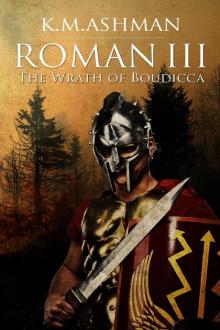 The Wrath of Boudicca
The Wrath of Boudicca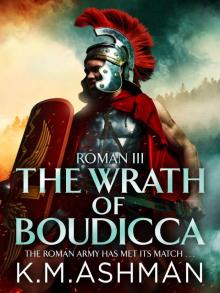 The Rise of Caratacus
The Rise of Caratacus Vampire
Vampire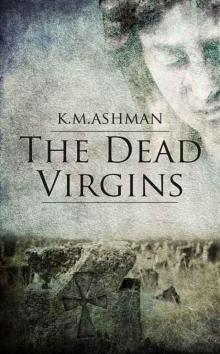 The Dead Virgins (The India Sommers Mysteries Book 1)
The Dead Virgins (The India Sommers Mysteries Book 1)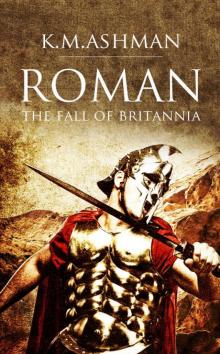 Roman - The Fall of Britannia
Roman - The Fall of Britannia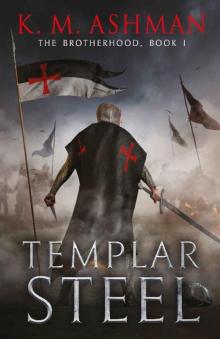 Templar Steel
Templar Steel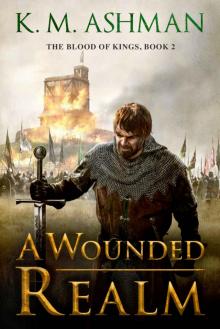 A Wounded Realm
A Wounded Realm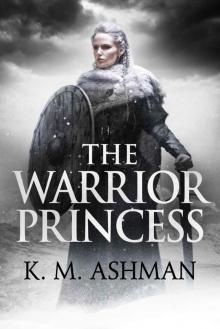 The Warrior Princess
The Warrior Princess